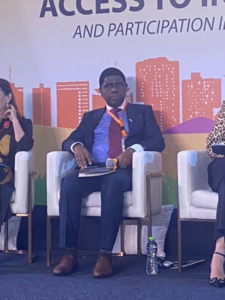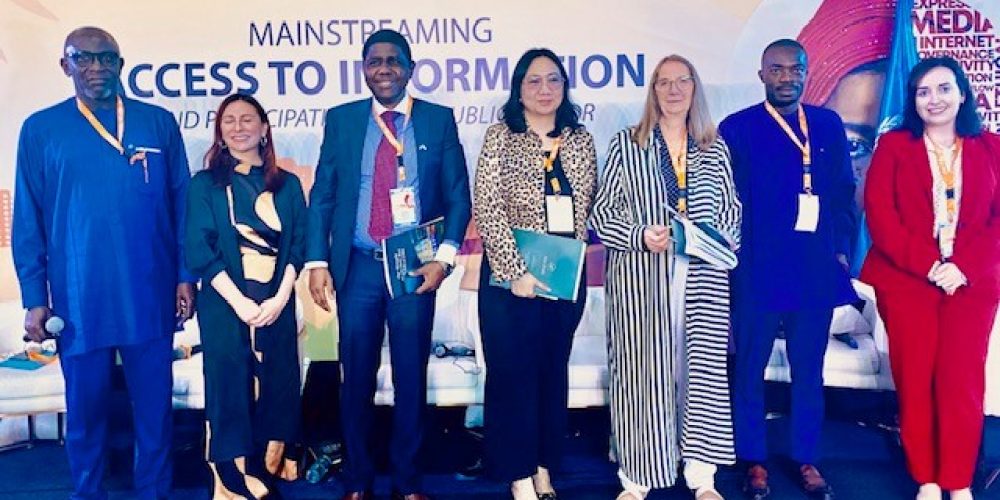Chairman and Information Commissioner of the Right to Access Information Commission (RAIC), Dr Ibrahim Seaga Shaw, has highlighted the Commission’s achievements over the past decade, emphasizing their potential as a model for younger nations in the Access to Information (ATI) space. Dr. Shaw made these remarks during a panel discussion at the global commemoration of the International Day for Universal Access to Information (IDUAI) in Accra, Ghana, where he spoke on the theme: Addressing Societal Challenges through Access and Citizens’ Participation.
Dr. Shaw underscored the transformation within RAIC-Sierra Leone, which has significantly expanded public awareness and forged partnerships with institutions such as the Audit Service Sierra Leone, the Anti-Corruption Commission, and the National Monitoring and Evaluation Agency (NAMEA). These partnerships, he noted, have restored public trust in the ATI law as a tool for holding public authorities accountable.
As an example of this progress, Dr. Shaw cited the coalition of civil society organizations (CSOs) that recently requested information from the Attorney General and Secretary to the President concerning the tribunal recommendation that led to the suspension of the Auditor General and her deputy. This request, he noted, symbolizes the renewed trust citizens have in the Commission’s ability to foster transparency.
Dr. Shaw also highlighted another notable case where a lawyer requested certain provisional election results from the Electoral Commission of Sierra Leone (ECSL) amid post-election tensions. The matter was amicably resolved through RAIC’s intervention, which, he said, demonstrated the Commission’s role in enhancing democratic participation in the country.

Turning to societal and environmental concerns, Dr. Shaw emphasized the issue of climate change and explained how RAIC’s consultations with Sierra Leone’s regulatory bodies—the National Minerals Agency (NMA) and the Environment Protection Agency (EPA)—have compelled these agencies to comply with proactive disclosure obligations, making them more transparent and open to public scrutiny. He also mentioned the Black Johnson fishing harbour dispute, which was successfully resolved through ATI-prompted negotiations between local communities, a Chinese company and the Government of Sierra Leone through the Ministry of Fisheries and Marine Resources
Dr. Shaw announced that RAIC recently launched digital access to information platforms, enabling citizens to request information, receive acknowledgment, respond to inquiries, and file complaints with RAIC in real-time.
“As we commemorate IDUAI 2024, we remain committed to ensuring access to information is an effortless process and a gateway to other rights that positively impact all, regardless of race, gender, social status, or political affiliation,” Dr. Shaw concluded.
This panel session, which was one of a series in the two-day symposium organized by UNESCO and the Government of Ghana in Accra on 1-2 October to mark the global commemoration of the International Day of Universal Access to Information(IDUAI), was convened and moderated by Marie Whellan of the Paris-based Organisation for Economic Cooperation and Development (OECD).

Deputy minister of MOICE, Chairman-RAIC and Comm. Manager-RAIC
Deputy Minister of Information and Civic Education (MOICE), Bockarie Abdel Aziz Bawoh, who also served as a panelist alongside other Ministers from the subregion, including Ghana’s Minister of Information, Fatimatu Abu Bakarr, outlined the efforts of the Sierra Leone government to enhance citizens’ access to information. He highlighted key initiatives such as President Bio’s town hall meetings, where citizens engage directly with the President on policy and livelihood issues; weekly press briefings with public officials; the strengthening of RAIC’s independence; and the repeal of Part Five of the 1965 Public Order Act. These initiatives, Bawoh emphasized, demonstrate the government’s commitment to ATI.
Ghana’s Minister of Information and Communications, Fatimatu Abu Bakarr, welcomed participants to Accra and expressed pride in Ghana’s recent progress in ATI, which has empowered citizens to scrutinize government actions. She noted that the Right to Information Commission of Ghana has successfully taken legal action against public institutions that refused to honor access to information requests, reinforcing the importance of mainstreaming ATI across the public sector to bridge the gap between governments and citizens.
In his closing remarks, Dr Tawfik Jelassi, Assistant Director General for Information and Communications at UNESCO, thanked Ghana for being the first African country to host IDUAI. He recalled that in 2010, only 10 African nations had ATI legislation, while today, 29 countries have implemented such laws, marking significant progress. He urged government ministers, information commissioners, and participants to carry forward the lessons from IDUAI 2024 and continue collaborating globally to mainstream ATI practices.
For media inquiries, contact:
David Patrick Kamara
Manager, Public Information and Communications
Right to Access Information Commission (RAIC) National Secretariat
+23278407847
Email: david.kamara@raic.gov.sl





